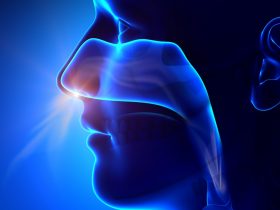At the recent American Rhinologic Society, Combined Otolaryngology Spring Meeting (ARS-COSM) in Boston, Massachusetts (May 4-5, 2023), researchers from Northwestern University, Chicago, and Johns Hopkins School of Medicine, Baltimore, presented a study highlighting the association between loss of smell and disease burden and dupilumab efficacy in patients with chronic rhinosinusitis with nasal polyps (CRSwNP).
CRSwNP is a type 2-mediated inflammatory disease of the nasal cavity and paranasal sinuses, associated with a high symptom burden and poor health-related quality of life (HRQoL). Anosmia, or loss of smell, is one of the most significant burdens for patients with CRSwNP. dupilumab, a novel immunotherapeutic for severe, inadequately controlled CRSwNP, is often linked to a significant improvement in the sense of smell. However, the underlying mechanism has yet to be quantitatively confirmed.
The objective of the study was to investigate the association between the baseline loss of smell and other aspects of disease in CRSwNP and evaluate the effects of dupilumab based on the severity of baseline loss of smell. The study used Least square mean change from the baseline to investigate how dupilumab may alleviate anosmia in patients with CRSwNP. Patients were randomized to dupilumab 300 mg or placebo every 2 weeks with 7-day baseline average. Moreover, the patients’ loss of smell (LoS) scores were divided into moderate and severe subgroups.
Study results indicated that 83% of the randomized patients reported severe LoS while 14.6% had a moderate LoS at baseline. Furthermore, patients with severe LoS had a greater incidence of asthma, prior surgery, and anti-inflammatory respiratory diseases. In addition, dupilumab brought significant improvements in nasal poly score (NPS) as well as nasal congestions (NC) and sino nasal outcome test (SNOT-22) scores. dupilumab also improved the objective and patient reported CRSwNP outcomes (HRQoL) considerably compared to placebo in patients having severe and moderate LoS at baseline.
The above findings suggest that dupilumab may be a promising therapeutic option for patients with CRSwNP and loss of smell. However, further studies are needed to examine its safety and efficacy in the long term, and to determine the optimal dosing and treatment duration for patients with CRSwNP.
The authors of the study were Z. Soler from Northwestern University, Chicago, IL; A.P Lane from Department of Otolaryngology, Johns Hopkins School of Medicine, Baltimore; Z.M Patel from Department of Otolaryngology, Stanford University School of Medicine, Stanford, CA; J.L Mattos from Department of Otolaryngology, University of Virginia Health System, Charlottesville, VA; C. Xia and S. Nash from Regeneron Pharmaceuticals Inc, Tarrytown, NY; and A.H Khan from Sanofi, Chilly-Mazarin, France.
Reference:
Soler Z, Lane AP, Patel ZM, Mattos JL, Xia C, Nash,S, Khan AH. Association between loss of smell and disease burden and dupilumab efficacy in patients with chronic rhinosinusitis with nasal polyps. ARS-COSM. May 4-5, 2023.







